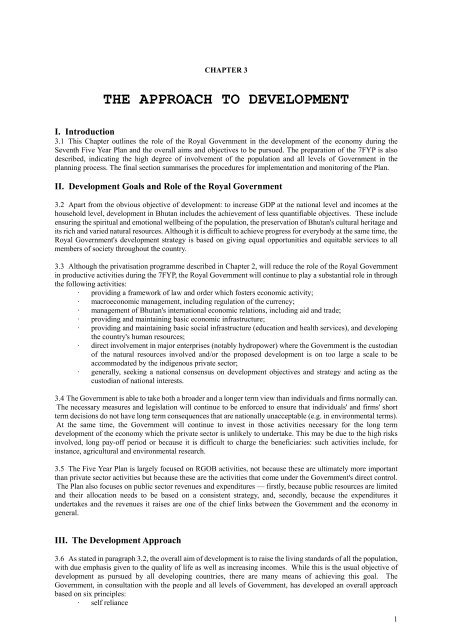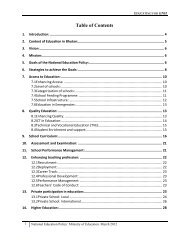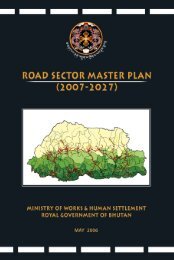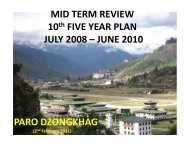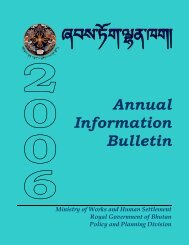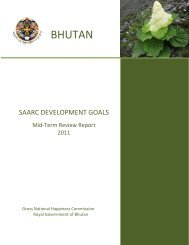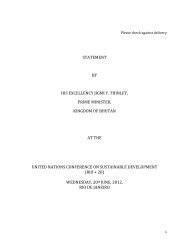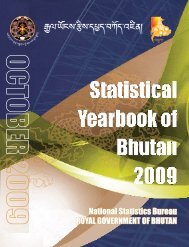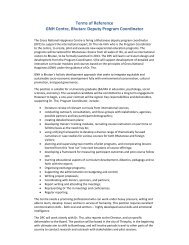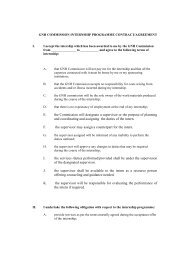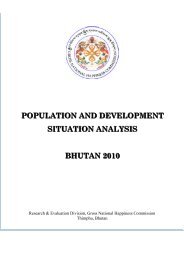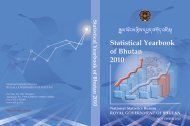COUNTRY BACKGROUND - Gross National Happiness Commission
COUNTRY BACKGROUND - Gross National Happiness Commission
COUNTRY BACKGROUND - Gross National Happiness Commission
You also want an ePaper? Increase the reach of your titles
YUMPU automatically turns print PDFs into web optimized ePapers that Google loves.
CHAPTER 3<br />
THE APPROACH TO DEVELOPMENT<br />
I. Introduction<br />
3.1 This Chapter outlines the role of the Royal Government in the development of the economy during the<br />
Seventh Five Year Plan and the overall aims and objectives to be pursued. The preparation of the 7FYP is also<br />
described, indicating the high degree of involvement of the population and all levels of Government in the<br />
planning process. The final section summarises the procedures for implementation and monitoring of the Plan.<br />
II. Development Goals and Role of the Royal Government<br />
3.2 Apart from the obvious objective of development: to increase GDP at the national level and incomes at the<br />
household level, development in Bhutan includes the achievement of less quantifiable objectives. These include<br />
ensuring the spiritual and emotional wellbeing of the population, the preservation of Bhutan's cultural heritage and<br />
its rich and varied natural resources. Although it is difficult to achieve progress for everybody at the same time, the<br />
Royal Government's development strategy is based on giving equal opportunities and equitable services to all<br />
members of society throughout the country.<br />
3.3 Although the privatisation programme described in Chapter 2, will reduce the role of the Royal Government<br />
in productive activities during the 7FYP, the Royal Government will continue to play a substantial role in through<br />
the following activities:<br />
· providing a framework of law and order which fosters economic activity;<br />
· macroeconomic management, including regulation of the currency;<br />
· management of Bhutan's international economic relations, including aid and trade;<br />
· providing and maintaining basic economic infrastructure;<br />
· providing and maintaining basic social infrastructure (education and health services), and developing<br />
the country's human resources;<br />
· direct involvement in major enterprises (notably hydropower) where the Government is the custodian<br />
of the natural resources involved and/or the proposed development is on too large a scale to be<br />
accommodated by the indigenous private sector;<br />
· generally, seeking a national consensus on development objectives and strategy and acting as the<br />
custodian of national interests.<br />
3.4 The Government is able to take both a broader and a longer term view than individuals and firms normally can.<br />
The necessary measures and legislation will continue to be enforced to ensure that individuals' and firms' short<br />
term decisions do not have long term consequences that are nationally unacceptable (e.g. in environmental terms).<br />
At the same time, the Government will continue to invest in those activities necessary for the long term<br />
development of the economy which the private sector is unlikely to undertake. This may be due to the high risks<br />
involved, long pay-off period or because it is difficult to charge the beneficiaries: such activities include, for<br />
instance, agricultural and environmental research.<br />
3.5 The Five Year Plan is largely focused on RGOB activities, not because these are ultimately more important<br />
than private sector activities but because these are the activities that come under the Government's direct control.<br />
The Plan also focuses on public sector revenues and expenditures — firstly, because public resources are limited<br />
and their allocation needs to be based on a consistent strategy, and, secondly, because the expenditures it<br />
undertakes and the revenues it raises are one of the chief links between the Government and the economy in<br />
general.<br />
III. The Development Approach<br />
3.6 As stated in paragraph 3.2, the overall aim of development is to raise the living standards of all the population,<br />
with due emphasis given to the quality of life as well as increasing incomes. While this is the usual objective of<br />
development as pursued by all developing countries, there are many means of achieving this goal. The<br />
Government, in consultation with the people and all levels of Government, has developed an overall approach<br />
based on six principles:<br />
· self reliance<br />
1


